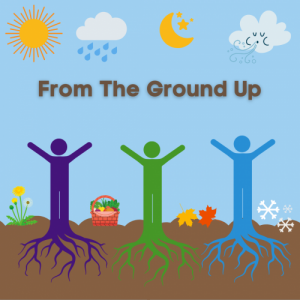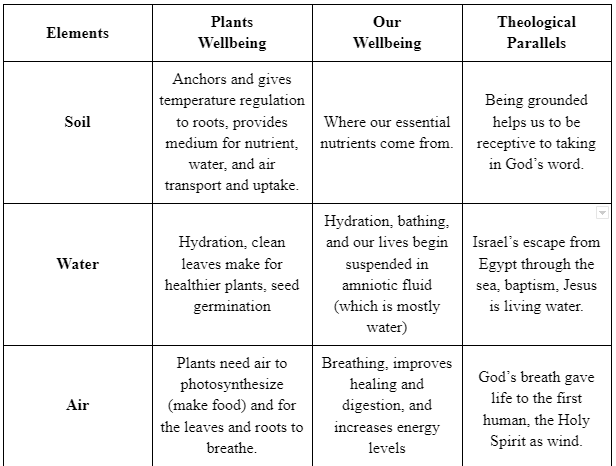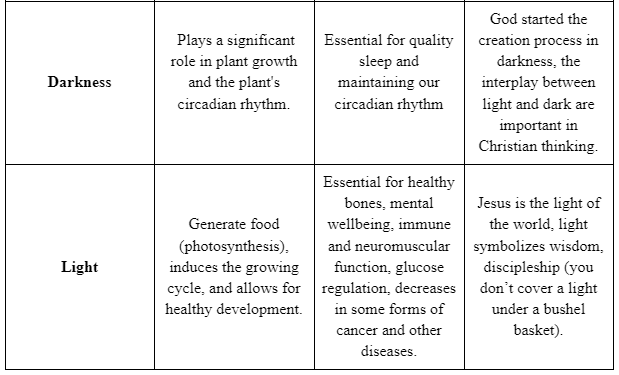
From The Ground Up: Digging Deeper Into Our Body-Garden Connection
Over the last several years, there has been a significant increase in the number of articles that discuss the health benefits that people can gain through gardening – opportunities for movement and relationship development, improved mental and spiritual wellbeing, chances to grow local/sustainable food, among other things – which is wonderful. As a gardener myself, I can attest to some of the health benefits I have personally received.
As a result of this recent attention, I have found myself increasingly drawn towards reflecting on our body-garden connection, particularly because I find that so many articles (not all) touch only on the surface-level health benefits of gardening, thus missing the richness that can come from digging more deeply into why there is such a strong connection.
So, why is gardening so good for our health?
1. I think it’s because what both our bodies and plants need to thrive are essentially the same! And, really, this shouldn’t be any surprise given that our lives started in a garden:
“And the Lord God planted a garden in Eden, in the east; and there he put the man whom he had formed. Out of the ground the Lord God made to grow every tree that is pleasant to the sight and good for food, the tree of life also in the midst of the garden, and the tree of the knowledge of good and evil.” ~Genesis 2:8-9
Because people and plants share the same basic needs, and since humans and gardens have such a long-standing relationship, it should be no surprise that there are notable theological parallels that illuminate this connection.


I have read that Jesus used agricultural illustrations because this is what people knew. However, equally important, and not frequently discussed, is the fact that there is, indeed, a fundamental link between people and plants. I believe this chart, which is far from an exhaustive comparison, is a case in point of this deep connection!
2. People and plants are both deeply impacted by what season of life they are experiencing. Spring, summer, fall, winter… new growth, maturation, flower/harvest, dormancy. Plants and people alike experience different seasons, and each season presents different needs. Paying attention to these changes, and the needs that come with them, is crucial for how we attend to the wellbeing of both our gardens and our lives: daily, weekly, monthly, yearly.
In the midst of this familiar rhythm and shared commonality of each season, then, there is also a uniqueness in the needs each season presents and, thus, how we are called to tend to ourselves in each season that plays a vital role in our collective wellbeing.
As we move through different seasons, it becomes important for us to consider some important questions, such as:
- What was used up in the previous season?
- What do we need to be particularly mindful of during this season?
For example, some plants have especially intense nutrient needs – such as nitrogen, phosphorus, and potassium – at particular times, while others use up lesser amounts. Thus, proper fertilization and crop rotation are essential for a healthy garden. As people, we, too, have certain needs at certain times. Family expectations, work obligations, health/medical challenges, celebrations (graduations, weddings, reunions), experiences of loss and/or difficult transitions (jobs, retirement, moving, death), all may bring with them different requirements, meaning how we tend to ourselves in them may change.
As such, it is important for us to make an assessment of how we are doing on a regular basis. What aspects of our wellbeing (physical, mental, emotional, spiritual, relational, etc.) are feeling parched or malnourished? What are we pleased with? What needs might require attention soon? Just as a garden needs regular care, so do we! (Click here if you would like to utilize our wellness assessment.)
3. Both people and plants need others to thrive!
In a garden, there are certain plants that get along well with each other. This is the concept of companion plants. Each has a role in the garden’s collective wellbeing. Some attract pollinators, others suppress weeds, others ward off “bad” bugs, while others provide shade. Essentially, companion plants grow well together, each contributing to the good of the other. Thus, intentionally increasing the diversity of plants increases the health of the garden.
Likewise, we need people in our lives who will help us to enrich our experience, show us new ways of thinking, expose our blind spots, and generally round out our human experience. Moreover, we also need to be willing to do this for other people, too. As with a garden, “mono-culture” is also detrimental to humans as we move through life’s various seasons.
As we enter into the summer season, I want to challenge you to do some digging around in your figurative and/or literal garden and ask yourself:
- Which of the basic elements do you feel called to tend to this season?
- What sort of companion (plants) do you need?
- What are you uniquely able to contribute to others?
May all be well,
Karen H. Webster
HSHC Co-founder/Executive Director
